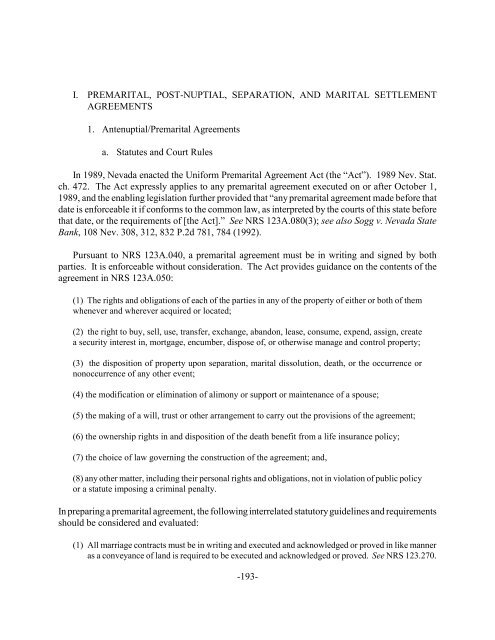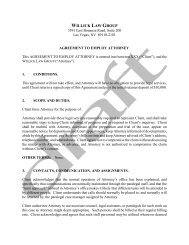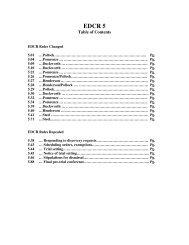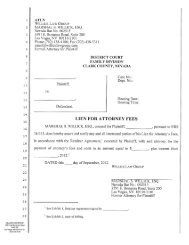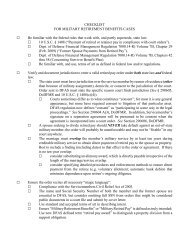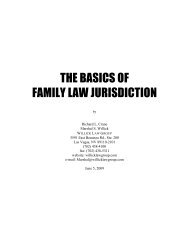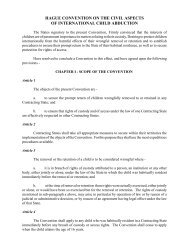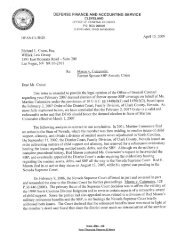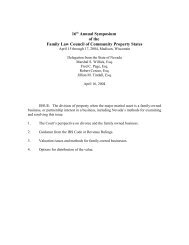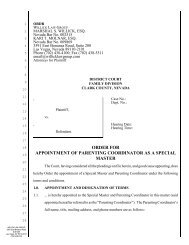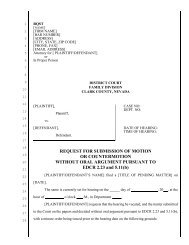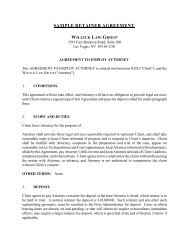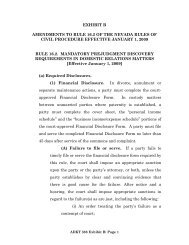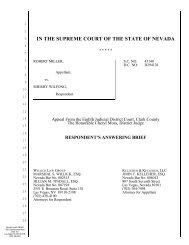Premarital, Post-Nuptial, Separation, and Marital ... - Willick Law Group
Premarital, Post-Nuptial, Separation, and Marital ... - Willick Law Group
Premarital, Post-Nuptial, Separation, and Marital ... - Willick Law Group
Create successful ePaper yourself
Turn your PDF publications into a flip-book with our unique Google optimized e-Paper software.
I. PREMARITAL, POST-NUPTIAL, SEPARATION, AND MARITAL SETTLEMENT<br />
AGREEMENTS<br />
1. Antenuptial/<strong>Premarital</strong> Agreements<br />
a. Statutes <strong>and</strong> Court Rules<br />
In 1989, Nevada enacted the Uniform <strong>Premarital</strong> Agreement Act (the “Act”). 1989 Nev. Stat.<br />
ch. 472. The Act expressly applies to any premarital agreement executed on or after October 1,<br />
1989, <strong>and</strong> the enabling legislation further provided that “any premarital agreement made before that<br />
date is enforceable it if conforms to the common law, as interpreted by the courts of this state before<br />
that date, or the requirements of [the Act].” See NRS 123A.080(3); see also Sogg v. Nevada State<br />
Bank, 108 Nev. 308, 312, 832 P.2d 781, 784 (1992).<br />
Pursuant to NRS 123A.040, a premarital agreement must be in writing <strong>and</strong> signed by both<br />
parties. It is enforceable without consideration. The Act provides guidance on the contents of the<br />
agreement in NRS 123A.050:<br />
(1) The rights <strong>and</strong> obligations of each of the parties in any of the property of either or both of them<br />
whenever <strong>and</strong> wherever acquired or located;<br />
(2) the right to buy, sell, use, transfer, exchange, ab<strong>and</strong>on, lease, consume, expend, assign, create<br />
a security interest in, mortgage, encumber, dispose of, or otherwise manage <strong>and</strong> control property;<br />
(3) the disposition of property upon separation, marital dissolution, death, or the occurrence or<br />
nonoccurrence of any other event;<br />
(4) the modification or elimination of alimony or support or maintenance of a spouse;<br />
(5) the making of a will, trust or other arrangement to carry out the provisions of the agreement;<br />
(6) the ownership rights in <strong>and</strong> disposition of the death benefit from a life insurance policy;<br />
(7) the choice of law governing the construction of the agreement; <strong>and</strong>,<br />
(8) any other matter, including their personal rights <strong>and</strong> obligations, not in violation of public policy<br />
or a statute imposing a criminal penalty.<br />
In preparing a premarital agreement, the following interrelated statutory guidelines <strong>and</strong> requirements<br />
should be considered <strong>and</strong> evaluated:<br />
(1) All marriage contracts must be in writing <strong>and</strong> executed <strong>and</strong> acknowledged or proved in like manner<br />
as a conveyance of l<strong>and</strong> is required to be executed <strong>and</strong> acknowledged or proved. See NRS 123.270.<br />
-193-
(2) Every promise or undertaking made upon consideration of marriage, except mutual promises to<br />
marry, is void unless it is in writing <strong>and</strong> subscribed by the party to be charged. See NRS 111.220.<br />
But see NRS 41.370 to 41.420, inclusive, also abolishing the cause of action in Nevada of breach<br />
of promise to marry.<br />
(3) The agreement may eliminate alimony or support or maintenance of a spouse. See NRS<br />
123A.050(1)(d). If the elimination of alimony would make the person who is being denied alimony<br />
eligible for public assistance, however, a court can disregard the provision eliminating alimony “to<br />
the extent necessary to avoid that eligibility.” NRS 123.080(2).<br />
(4) The agreement may provide for or require the execution of wills to carry out the terms of the<br />
agreement. See NRS 123A.050(1)(e).<br />
(5) The right of a child to support may not be adversely affected by a premarital agreement. See NRS<br />
123A.050(2).<br />
(6) A premarital agreement may expressly override the otherwise-applicable duty of a court to make an<br />
equal distribution of community property <strong>and</strong> corresponding distribution of property held in joint<br />
tenancy. See NRS 125.150.<br />
These considerations bear directly upon the ultimate enforceability of a prenuptial agreement.<br />
NRS 123.080(1) provides that a premarital agreement is not enforceable if the party against whom<br />
enforcement is sought proves that:<br />
(a) That party did not execute the agreement voluntarily;<br />
(b) The agreement was unconscionable when it was executed; or<br />
(c) Before execution of the agreement, that party:<br />
(1) Was not provided a fair <strong>and</strong> reasonable disclosure of the property or financial obligations<br />
of the other party;<br />
(2) Did not voluntarily <strong>and</strong> expressly waive, in writing, any right to disclosure of the<br />
property or financial obligations of the other party beyond the disclosure provided; <strong>and</strong><br />
(3) Did not have, or reasonably could not have had, an adequate knowledge of the property<br />
or financial obligations of the other party.<br />
NRS 123A.180(3) provides that the question of unconscionability is to be decided by the reviewing<br />
court as a matter of law.<br />
If the marriage is determined to be void, any premarital agreement between the parties is<br />
enforceable “only to the extent necessary to avoid an inequitable result.” NRS 123A.090. The<br />
statute of limitation is tolled during the marriage, but any equitable defenses relating to enforcement,<br />
including laches <strong>and</strong> estoppel, are available to either party. NRS 123A.100.<br />
b. Cases<br />
In Sargeant v. Sargeant, 88 Nev. 223, 495 P.2d 618 (1972), the Nevada Supreme Court noted<br />
the existence of a prenuptial agreement between the parties. Without squarely addressing the validity<br />
-194-
or enforceability of the agreement, the Court impliedly upheld it by proceeding from the presumption<br />
that all the assets belonged to the husb<strong>and</strong>, while noting that the agreement was apparently executed<br />
on the date of marriage, <strong>and</strong> that the wife did not underst<strong>and</strong> its terms.<br />
Under Nevada common law, a premarital agreement should be enforced <strong>and</strong> is not void as<br />
against public policy if its provisions are fair <strong>and</strong> reasonable, the agreement is underst<strong>and</strong>able, <strong>and</strong><br />
it was not procured through fraud, misrepresentation, or non-disclosure. See Buettner v. Buettner,<br />
89 Nev. 39, 45, 505 P.2d 600, 604 (1973). As with all contracts, the courts of this state retain power<br />
to refuse to enforce a particular premarital agreement if it is unconscionable, obtained through fraud,<br />
misrepresentation, material non-disclosure, or duress. Id. If issues of fraud, misrepresentation <strong>and</strong><br />
mistake as to value were raised at trial, however, a later independent action to reform the agreement<br />
may be dismissed on the ground of res judicata, since the claim in question had already been directly<br />
considered. Spilsbury v. Spilsbury, 92 Nev. 464, 465-66, 553 P.2d 421, 422 (1976).<br />
<strong>Premarital</strong> agreements executed in another state are controlled by the law of that state at the time<br />
of the execution of the agreement. Braddock v. Braddock, 91 Nev. 735, 542 P.2d 1060 (1975)<br />
(whether a premarital agreement was entered into knowingly, freely, <strong>and</strong> voluntarily is a question<br />
of fact, <strong>and</strong> parties engaged to be married have a “confidential relationship”).<br />
As with all contracts, parties to a premarital agreement may orally modify the agreement, unless<br />
the agreement requires that modifications be made in writing. See Jensen v. Jensen, 104 Nev. 95,<br />
98, 753 P.2d 342, 344 (1988). Moreover, the parties’ consent to modification can be implied from<br />
their conduct if it is consistent with the asserted modification. 104 Nev. at 98, 753 P.2d at 344.<br />
In Daniel v. Baker, 106 Nev. 412, 414, 794 P.2d 345, 346 (1990), the Nevada Supreme Court<br />
found a premarital agreement to be invalid, without any significant analysis. The Court simply<br />
affirmed a district court ruling that an agreement by which the wife purportedly gave up all<br />
community property <strong>and</strong> alimony rights in exchange for $5,000.00 was unenforceable. Implicit in<br />
the Court’s recitation of the husb<strong>and</strong>’s accumulation of millions of dollars of wealth during a fifteen<br />
year marriage, while the wife accumulated almost nothing of value, was a finding that such a<br />
financial outcome was simply unconscionable.<br />
In Sogg v. Nevada State Bank, 108 Nev. 308, 832 P.2d 781 (1992), the Court considered a<br />
premarital agreement that had been entered into prior to Nevada’s adoption of the Uniform<br />
<strong>Premarital</strong> Agreements Act, <strong>and</strong> had been upheld by the trial court as having been voluntarily <strong>and</strong><br />
knowingly entered into by both parties.<br />
The Court began its review by stating that in such circumstances, it would review the validity<br />
of the agreement de novo, <strong>and</strong> that since the agreement was drafted prior to adoption of the Act, it<br />
would be upheld if it either conformed to the Act or to prior Nevada common law. 108 Nev at 312,<br />
832 P.2d at 783.<br />
The Court held that there is a presumed fiduciary relationship between fiances, <strong>and</strong> a<br />
presumption of fraud exists where the agreement greatly disfavors one of the parties. That<br />
-195-
presumption, however, can be overcome by a finding that the party claiming disadvantage “was not<br />
in fact disadvantaged.” 108 Nev. 312, 832 P.2d at 784. The agreement at issue here stripped the<br />
wife of all resources <strong>and</strong> means of support, <strong>and</strong> she would certainly have received more under<br />
community property law, so the agreement was presumably fraudulent. The Court adopted <strong>and</strong><br />
discussed a series of elements for its review from cases decided in Oregon <strong>and</strong> Washington.<br />
First is whether the disadvantaged party had ample opportunity to obtain the advice of<br />
independent counsel. See Muscelli v. Muscelli, 96 Nev. 41, 604 P.2d 1237 (1980). The Court<br />
distinguished a situation in which a prospective wife was given a proposed agreement seven or eight<br />
months before the marriage <strong>and</strong> repeatedly advised to consult with counsel, but refused. 108 Nev.<br />
at 312-13, 832 P.2d at 784. In this case, the husb<strong>and</strong>’s attorney selected “wife’s attorney” <strong>and</strong> set<br />
up her appointment, which took less than an hour <strong>and</strong> was incomplete (because the husb<strong>and</strong><br />
interrupted them), <strong>and</strong> the wife’s attorney refused to certify that he had independently advised her.<br />
The Court held that the agreement was procedurally defective since the wife never reviewed the<br />
entire agreement with independent counsel. 108 Nev. at 313, 832 P.2d at 784.<br />
Next is whether the disadvantaged party was coerced into making rash decisions. Included in<br />
this factor is any time pressure the party given the agreement was put under; the Court approvingly<br />
cited cases from elsewhere in which the first meeting to review a sample agreement was three days<br />
prior to its signature, the night before the wedding, <strong>and</strong> the wife did not have a copy of the agreement<br />
in the interim, or in which the wife found out about the agreement the day the parties left to get<br />
married. 108 Nev. at 313-14, 832 P.2d at 785. In this case, the wife had a brief meeting with<br />
counsel the day before the initial wedding date, which was interrupted by the husb<strong>and</strong>, <strong>and</strong> he<br />
canceled the wedding when she did not sign the agreement immediately. She did not see it again<br />
until after the parties had reconciled, on the date of the reset wedding, “when she was again under<br />
pressure to sign it because her wedding would be called off if she did not” do so. The Court found<br />
those circumstances to be coercive. 108 Nev. at 314, 832 P.2d at 785.<br />
A factor to be considered is whether the disadvantaged party had “substantial business experience<br />
<strong>and</strong> acumen.” Having run a business, <strong>and</strong> accumulating substantial assets, can be evidence sufficient<br />
to rebut the presumption of unfairness, but here the Court found that the wife’s management of her<br />
own finances while a singer, having worked demonstrating phones, <strong>and</strong> having engaged in a business<br />
deal that the Court termed “a swindle in which she was the unwary prey,” did not qualify. 108 Nev.<br />
at 314-15, 832 P.2d at 785-86.<br />
The final factor referenced is whether the disadvantaged party was aware of the financial<br />
resources of the other, <strong>and</strong> understood the rights that were being forfeited. The Court translated this<br />
into a duty of “full disclosure,” that if not met independently invalidated the premarital agreement:<br />
“premarital agreements will be enforced only where the party seeking to enforce the agreement fully<br />
disclosed his or her assets to the other party prior to signing.” 108 Nev. at 315, 832 P.2d at 786.<br />
Listing assets without values is not good enough to satisfy this condition, nor can it be met by<br />
asserting that the disadvantaged party “was familiar with his home, <strong>and</strong> that he had driven her around<br />
to see some of his other properties,” because although the wife knew the husb<strong>and</strong> was wealthy, she<br />
apparently underestimated that wealth, <strong>and</strong> so did not permit the wife “to make an informed decision<br />
-196-
with respect to the premarital agreement,” which was therefore invalid. Id.<br />
The next year, in Fick v. Fick, 109 Nev. 458, 851 P.2d 445 (1993), the Court started with the<br />
position that a premarital agreement relating to the division of property <strong>and</strong> the payment of support<br />
in the event of divorce is not void as contrary to public policy; however, the Court held that it does<br />
not defer to trial courts’ interpretation of such agreements, but instead repeated that the st<strong>and</strong>ard of<br />
appellate review is “de novo.” 109 Nev. at 463, 851 P.2d at 449.<br />
The Court held that a prenuptial agreement is unenforceable if it was unconscionable at<br />
execution, involuntarily signed, or the parties did not fully disclose assets <strong>and</strong> obligations before the<br />
agreement was executed. Furthermore, because of the presumed fiduciary relationship existing<br />
between parties who are engaged to be married, a presumption of fraud is found where the agreement<br />
entered into greatly disfavors one of the parties. 109 Nev. at 463, 851 P.2d at 449.<br />
Condensing its recitation of factors from Sogg, the Court held that the presumption of invalidity<br />
can be overcome by proving that the disadvantaged party: (1) had ample opportunity to consult an<br />
attorney, (2) was not coerced, (3) possessed substantial business acumen, <strong>and</strong> (4) understood the<br />
financial resources of the other party <strong>and</strong> the rights being forfeited under the agreement.<br />
Here, the trial court’s invalidation of an alimony waiver was affirmed since the husb<strong>and</strong> did not<br />
attach his schedule of assets until a year after the agreement was signed, even though the Court<br />
concluded that the wife had an opportunity to consult with legal counsel, was not coerced, <strong>and</strong><br />
“possessed the acumen to underst<strong>and</strong> the transaction.” 109 Nev. at 463-64, 851 P.2d at 449.<br />
Explaining, the Court held that fiances share a confidential, fiduciary relationship, <strong>and</strong> each has<br />
a responsibility to act with good faith <strong>and</strong> fairness to the other, which includes full disclosure prior<br />
to executing a premarital agreement. 109 Nev. at 464, 851 P.2d at 449-450. That duty was not<br />
satisfied by the husb<strong>and</strong>’s post-marital completion of a list of assets, which he had the wife initial,<br />
nor by the fact that the parties cohabited <strong>and</strong> started a business together. The Court held that given<br />
the extensive list of assets, the wife “could not have known the full magnitude of [the husb<strong>and</strong>’s]<br />
assets <strong>and</strong> obligations before marriage.” Id.<br />
Where a premarital agreement limited the alimony payable to a wife in the event of a divorce to<br />
a specific sum, but did not explicitly address the matter of temporary spousal support during the<br />
pendency of a divorce, the Nevada Supreme Court ruled that it was a matter outside of the scope of<br />
the agreement <strong>and</strong> the trial court was free to make an award for interim support. Dimick v. Dimick,<br />
112 Nev. 402, 915 P.2d 254 (1996). The case did not explicitly say whether or not a premarital<br />
agreement could restrict a party’s right to make a claim for support during the pendency of a divorce.<br />
The Nevada Supreme Court described its opinion in the opening line of Kantor v. Kantor, 116<br />
Nev. 886, 8 P.3d 825 (2000), as being a “multimillion dollar divorce case involving a premarital<br />
agreement.” The decision itself, however, turned on procedural issues involved in the wife’s attempt<br />
to amend her pleadings too close to the trial date.<br />
-197-
The premarital agreement at issue provided that the husb<strong>and</strong>’s earnings from his practice as a<br />
medical doctor were to be community funds, any other funds earned were to be separate property.<br />
The wife alleged on appeal that the trial court had erred by applying the terms of the premarital<br />
agreement without determining its validity <strong>and</strong> substantive fairness. The Court rebuffed that attack,<br />
however, holding that since the party disputing the validity of a premarital agreement has the burden<br />
of proving that an agreement is invalid <strong>and</strong> the wife’s amended answer had admitted to the validity<br />
of the premarital agreement, the district court was under no obligation to independently determine<br />
the validity <strong>and</strong> substantive fairness of the agreement. 116 Nev. at 893-94, 8 P.3d at 830.<br />
c. Discussion<br />
The statute’s use of “may” as to what an agreement can legitimately address leaves the parties<br />
free to negotiate <strong>and</strong> arrange their affairs in almost any order, except in ways that would violate law<br />
or public policy.<br />
However, no attorney should either prepare or approve a premarital agreement without first<br />
scrutinizing Sogg v. Nevada State Bank, 108 Nev. 308, 832 P.2d 781 (1992), which provides a<br />
veritable checklist of things to not do if the desire is to create an enforceable premarital agreement:<br />
The husb<strong>and</strong>’s attorney drafted the agreement <strong>and</strong> selected the wife’s attorney for review. The<br />
disadvantaged party was never advised that she should select her own attorney. The agreement did<br />
not have an asset list attached. The selected attorney for the disadvantaged party had a brief<br />
conference with the wife <strong>and</strong> refused to sign the advice certificate on the agreement. The<br />
disadvantaged party was not given a copy of the agreement to take to another attorney prior to<br />
signing. Thereafter, the disadvantaged party was not presented the agreement for review by<br />
independent counsel until the wedding day, <strong>and</strong> was not given time to consult independent counsel.<br />
The disadvantaged party was pressured into signing the agreement by, for example, being told that<br />
the imminent wedding would be called off if the disadvantaged party refused or failed to sign the<br />
agreement.<br />
It is unclear how many of these actions would have had to have been not present (or perhaps less<br />
egregious) to have changed the result. The general tenor of the Court’s analysis in Sogg indicates<br />
that any of those actions would have been sufficient to invalidate the agreement. On the other h<strong>and</strong>,<br />
the Court’s analysis is Kantor mentions the wife’s allegation that there had been an insufficient<br />
disclosure, but readily dismissed it on the procedural ground that her attorney had admitted to<br />
validity of the agreement there at issue. Given its peculiar procedural context, it is unclear whether<br />
Kantor indicates that the Court may be more deferential to enforcement of premarital agreements<br />
in the future than its existing case law would indicate.<br />
Fick, in dicta, throws into the mix the question of how much “ability to consult an attorney” is<br />
“ample.” From the cases approvingly cited in Sogg, it seems pretty clear that any premarital<br />
agreement executed within days of a pre-planned wedding is at least vulnerable, if not presumptively<br />
invalid, even if the spouse does get access to an attorney in that time. The Nevada Supreme Court<br />
has weighed in on the side of courts that find a threat to cancel the wedding if the agreement is not<br />
signed to be “coercive.” Therefore, the closer the planned wedding date, the greater the presumptive<br />
-198-
pressure on the disadvantaged spouse to avoid embarrassment <strong>and</strong> financial loss, <strong>and</strong> the greater is<br />
the pressure on that spouse to sign whatever is put in front of her (to date, all such cases in this state<br />
have involved the wife as the disadvantaged party).<br />
As noted above, Nevada common law permits oral modifications to premarital agreements, like<br />
all other contracts, unless the agreement requires that modifications be made in writing, <strong>and</strong> the<br />
Nevada Supreme Court has even provided that consent to the modification can be implied by<br />
conduct. Jensen v. Jensen, 104 Nev. 95, 98, 753 P.2d 342, 344 (1988). Counsel seeking to avoid<br />
litigation regarding alleged oral modifications should therefore provide that any modification must<br />
be by written instrument executed with the same formality as the original.<br />
A premarital agreement should provide that the effective date of the agreement is the date of<br />
marriage, <strong>and</strong> acknowledge <strong>and</strong> set forth the provisions of NRS 123A.050 in the preamble (to<br />
prevent any later claim that these content requirements were unknown). The agreement should<br />
incorporate the recitals <strong>and</strong> should contemplate the following non-exclusive list of considerations:<br />
(1) the property owned by each;<br />
(2) each party’s income <strong>and</strong> earnings;<br />
(3) the obligations owed by each;<br />
(4) the intent of the parties as to the future status of their existing separate property, including<br />
any modifications sought as to the common law rules relating to transmutation <strong>and</strong><br />
commingling of that separate property with future community property as explained in the<br />
case law, <strong>and</strong> any limitations on the ability of each party to invest, re-invest, or dispose of<br />
that separate property;<br />
(5) whether <strong>and</strong> how there can be any transmutation of community property into separate<br />
property, <strong>and</strong> what happens if community property is commingled with separate property;<br />
(6) the characterization or other treatment of wages <strong>and</strong> salaries after marriage;<br />
(7) provisions for support during marriage;<br />
(8) the provision for or waiver of support if there be separation or divorce (with an eye toward<br />
the exception for cases in which the disadvantaged spouse is forced to rely upon public<br />
assistance, see NRS 123A.080(2));<br />
(9) a provision for life insurance policies already existing or contemplated for the future;<br />
(10) a provision as to retirement benefits accrued after marriage, including the survivorship<br />
benefits relating to any such retirement benefits, <strong>and</strong> acknowledging that under ERISA<br />
or other law, post-marital documents might have to be executed to carry into effect<br />
-199-
provisions of premarital agreements relating to retirement benefits or survivorship<br />
benefits;<br />
(11) the treatment of future acquisitions of property (as community, jointly-owned, or<br />
separate), <strong>and</strong> any rules governing that treatment if at variance with common law;<br />
(12) a designation of what if anything is to be deemed or treated as community property after<br />
marriage;<br />
(13) whether to provide for the future filing of tax returns, <strong>and</strong> whether such filings should<br />
have any impact on the characterization of any property;<br />
(14) a provision for the execution of required or necessary documents;<br />
(15) a provision stating that the terms of the agreement are intended to govern in the event of<br />
divorce;<br />
(16) provisions contemplating the death of each spouse before the other, including a provision<br />
for execution of wills or other estate planning documents if necessary to carry out terms<br />
of the agreement;<br />
(17) the binding effect of the agreement on heirs, administrators, personal representatives <strong>and</strong><br />
assigns;<br />
(18) the governing law being that of the State of Nevada;<br />
(19) the enforcement of the agreement <strong>and</strong> provision for attorneys’ fees <strong>and</strong> costs, including<br />
consideration of clauses imposing such fees <strong>and</strong> costs on any person unsuccessfully<br />
challenging the provisions of the agreement;<br />
(20) verification that both parties have received advice of independent counsel in the<br />
execution of the agreement, including separate certificates acknowledging legal advice<br />
given by each attorney;<br />
(21) the acknowledgment that neither party is deemed the drafter of the agreement, if<br />
appropriate;<br />
(22) the provision for payment of costs of drafting or negotiating the agreement; <strong>and</strong><br />
(23) the signatures of each party with an acknowledgment before a notary.<br />
The agreement should conclude with the acknowledgment that, before executing the agreement,<br />
both parties have investigated, <strong>and</strong> acknowledge <strong>and</strong> agree that the agreement is in compliance with<br />
the provisions of NRS Chapter 123A, <strong>and</strong> specifically NRS 123A.080, <strong>and</strong> that each party<br />
-200-
acknowledges that he or she:<br />
(1) executed the agreement voluntarily;<br />
(2) agrees that the agreement, by its terms, is not unconscionable;<br />
(3) was provided a fair <strong>and</strong> reasonable disclosure of the property <strong>and</strong> financial obligations of the<br />
other party <strong>and</strong>/or waives the right to disclosure beyond that disclosure provided;<br />
(4) has, or reasonably could have had, an adequate knowledge of the property <strong>and</strong>/or financial<br />
obligations of the other party; <strong>and</strong><br />
(5) has had the benefit of advice from independent legal counsel in the preparation <strong>and</strong> execution<br />
of the agreement.<br />
d. Local Rules<br />
There are no local rules specifically applicable to premarital agreements.<br />
2. <strong>Post</strong>nuptial <strong>and</strong> <strong>Separation</strong> Agreements<br />
Agreements made between couples after marriage fall into two categories: (1) postnuptial<br />
agreements; <strong>and</strong> (2) separation agreements (also sometimes called property settlements, marital<br />
settlements, <strong>and</strong> marital termination agreements). In the case of the former, the parties intend to<br />
remain married <strong>and</strong> living together, while in the case of the latter, the parties intend to separate. The<br />
distinction is important because real <strong>and</strong> different consequences flow from the type of agreement the<br />
parties execute. Whether an agreement is a postnuptial agreement or a separation agreement depends<br />
on the intention of the parties. 45<br />
a. Statutes <strong>and</strong> Court Rules<br />
A husb<strong>and</strong> <strong>and</strong> wife may enter into agreements with each other respecting property following<br />
their marriage. See NRS 123.070. NRS 123.080 provides:<br />
1. A husb<strong>and</strong> <strong>and</strong> wife cannot by any contract with each other alter their legal relations except as<br />
to property, <strong>and</strong> except that they may agree to an immediate separation <strong>and</strong> may make provision for<br />
the support of either of them <strong>and</strong> of their children during such separation.<br />
2 The mutual consent of the parties is a sufficient consideration for such an agreement as is<br />
45<br />
1 Alex<strong>and</strong>er Lindey <strong>and</strong> Louis I. Parley, LINDEY AND PARLEY ON SEPARATION AGREEMENTS AND ANTENUPTIAL<br />
CONTRACTS § 1.21[1] (1998). See, e.g., Combs v. Sherry-Combs, 865 P.2d 50, 54 (Wyo. 1993). (“A postnuptial must<br />
be distinguished from a separation agreement. A separation agreement, entered into by parties in anticipation of<br />
immediate separation or after separation, is favored in the law.”)<br />
-201-
mentioned in subsection 1.<br />
3. In the event that a suit for divorce is pending or immediately contemplated by one of the spouses<br />
against the other, the validity of such agreement shall not be affected by a provision therein that the<br />
agreement is made for the purpose of removing the subject matter thereof from the field of litigation,<br />
<strong>and</strong> that in the event of a divorce being granted to either party, the agreement shall become effective<br />
<strong>and</strong> not otherwise.<br />
4. If a contract executed by a husb<strong>and</strong> <strong>and</strong> wife, or a copy thereof, be introduced in evidence as an<br />
exhibit in any divorce action, <strong>and</strong> the court shall by decree or judgment ratify or adopt or approve<br />
the contract by reference thereto, the decree or judgment shall have the same force <strong>and</strong> effect <strong>and</strong><br />
legal consequences as though the contract were copied into the decree, or attached thereto.<br />
Every promise or undertaking made upon consideration of marriage, if not in writing <strong>and</strong><br />
subscribed by the person charged therewith, is void, except the mutual promise to marry. See NRS<br />
111.220. But see NRS 41.370 to 41.420, inclusive, also abolishing the cause of action in Nevada<br />
of breach of promise to marry.<br />
All marriage contracts or settlements must be in writing <strong>and</strong> executed <strong>and</strong> acknowledged or<br />
proved in the same manner as conveyances of l<strong>and</strong>. NRS 123.270. That provision has been labeled<br />
the “Statute of Frauds regarding marriage contracts.” Occhiuto v. Occhiuto, 97 Nev. 143, 145 n.1,<br />
625 P.2d 568, 569 n.1 (1981). The agreement should be recorded in each county where any<br />
conveyed or affected real property is located. NRS 123.280. Such recordation is deemed to impart<br />
notice to all persons. NRS 123.290.<br />
Divorce or annulment of marriage of a testator revokes a beneficial devise, legacy, or interest<br />
given to a former spouse in a will executed before entry of the decree, unless otherwise provided for<br />
in a property or separation agreement which is approved by the court in a divorce or annulment<br />
proceeding <strong>and</strong> not merged in the decree. See NRS 133.115; but see Riesterer v. Dietmeier, 98 Nev.<br />
279, 281, 646 P.2d 551, 553 (1982) (successfully rebutting the presumption of revocation created<br />
by NRS 133.110); Todara v. Todara, 92 Nev. 566, 568-69, 554 P.2d 738, 739-40 (1976) (finding<br />
that revocation of a will by divorce revokes as to property but does not revoke as to naming former<br />
spouse as executrix).<br />
b. Cases<br />
Separate property can be transmuted into community property by agreement of the parties, <strong>and</strong><br />
the agreement to do so may be oral. See Mullikin v. Jones, 71 Nev. 14, 27, 278 P.2d 876, 882<br />
(1955); but see Verheyden v. Verheyden, 104 Nev. 342, 757 P.2d 1328 (1988) (“the mere oral<br />
expression by a spouse that [property] purchased during the marriage is a ‘gift’ to the other spouse”<br />
does not overcome the community property presumption); also see Anderson v. Anderson, 107 Nev.<br />
570, 816 P.2d 463 (1991) (Concurring opinion of J. Springer) (protesting that the Court should have<br />
taken that opportunity to articulate that a writing is not required to transmute property after it is<br />
acquired).<br />
-202-
An agreement can provide for support <strong>and</strong> the division of property <strong>and</strong> survive the decree of<br />
divorce. The decree, however, must provide the agreement is not merged but survives the decree.<br />
Day v. Day, 80 Nev. 386, 389-90, 395 P.2d 321, 322-23 (1964).<br />
The parties may remove the subject matter of the agreement from litigation in divorce <strong>and</strong> they<br />
may agree to merge the agreement into the decree. Ballin v. Ballin, 78 Nev. 224, 230-31, 371 P.2d<br />
32, 36 (1962). Further, the parties may provide that the agreement survives the decree. Id., 78 Nev.<br />
at 230-31, 371 P.2d at 36.<br />
An agreement conveying a real property interest must be in writing. See NRS 111.210; Occhiuto<br />
v. Occhiuto, 97 Nev. 143, 147, 625 P.2d 568, 570 (1981). However, an oral agreement supported<br />
by documents of note <strong>and</strong> deed of trust can satisfy the statute of frauds <strong>and</strong> NRS 111.210(1). See<br />
Daniel v. Hiegel, 96 Nev. 456, 457, 611 P.2d 207, 208 (1980).<br />
Parties are estopped to assert the requirement that an agreement be in writing where an oral<br />
agreement at the time of separation dividing assets has been fully performed. See Schreiber v.<br />
Schreiber, 99 Nev. 453, 455, 663 P.2d 1189, 1190 (1983).<br />
An agreement for support may be consideration for an integrated agreement relating to property<br />
division <strong>and</strong> will therefore not be subject to modification. See Renshaw v. Renshaw, 96 Nev. 541,<br />
543, 611 P.2d 1070, 1071 (1980); Barbash v. Barbash, 91 Nev. 320, 322-23, 535 P.2d 781, 782-83<br />
(1975).<br />
However, a husb<strong>and</strong> <strong>and</strong> wife may not enter into a postnuptial agreement limiting one spouse’s<br />
duty of support to the other where they continue to live together as husb<strong>and</strong> <strong>and</strong> wife. See Cord v.<br />
Neuhoff, 94 Nev. 21, 24 n.3, 573 P.2d 1170, 1172 n.3 (1978). If the agreement purports to be an<br />
integrated agreement, that invalidity renders the entire agreement unenforceable. 94 Nev. at 24, 573<br />
P.2d at 1172.<br />
Even if the parties distributed property existing at the time of an agreement, future contributions<br />
from community property create a community property interest, even in properly transmuted<br />
property. Sly v. Sly, 100 Nev. 236, 679 P.2d 1260 (1984); Verheyden v. Verheyden, 104 Nev. 342,<br />
757 P.2d 1328 (1988). Where funds earned during marriage are used to make mortgage payments<br />
on a home, the non-titled spouse accumulates a pro tanto, pro rata share with each additional<br />
payment. Malmquist v. Malmquist, 106 Nev. 231, 792 P.2d 372 (1990); Robison v. Robison, 100<br />
Nev. 668, 691 P.2d 451 (1984) (community interest measured by the proportion that the purchase<br />
price is paid with community funds). Although title is in the name of only one party, the other has<br />
a half interest in the community property payments, <strong>and</strong> therefore also possesses an interest.<br />
Verheyden, supra, 104 Nev. at 344, 757 P.2d at 1330; but see Shydler v. Shydler, 114 Nev. 192, 954<br />
P.2d 37 (1998) (without substantial analysis, finding “substantial evidence” to support the lower<br />
court’s finding that a valuable property lot had been transmuted into the husb<strong>and</strong>’s separate property<br />
by means of a quit-claim deed executed by the wife in favor of the husb<strong>and</strong> a considerable time<br />
before divorce, despite a continuing series of payments on that property after execution of the quitclaim).<br />
-203-
<strong>Post</strong>nuptial <strong>and</strong> antenuptial agreements executed in another state are controlled by the law of that<br />
state at the time of the execution of the agreement. See Powers v. Powers, 105 Nev. 514, 516, 779<br />
P.2d 91, 92 (1989); Barbash, supra, 91 Nev. at 322, 535 P.2d at 782; Braddock v. Braddock, 91 Nev<br />
735, 738, 542 P.2d 1060, 1062 (1975).<br />
As with antenuptial agreements, separation agreements cannot be unconscionable, obtained<br />
through fraud, misrepresentation, material non-disclosure, or duress. See Braddock, supra, 91 Nev.<br />
at 739-40, 542 P.2d at 1062.<br />
Further, where one of the parties to a separation agreement or property settlement agreement is<br />
an attorney, <strong>and</strong> drafts the agreement, the Nevada Supreme Court essentially presumes fraud <strong>and</strong><br />
holds the drafting party to the fiduciary duty of an attorney-client relationship if the other spouse was<br />
unrepresented. Cook v. Cook, 112 Nev. 179, 912 P.2d 264 (1996) (when a lawyer-husb<strong>and</strong> drafts<br />
a property settlement agreement, he has a fiduciary relationship to his wife, in addition to the<br />
fiduciary relationship formed by the marriage itself; all such agreements subject to close scrutiny on<br />
appeal; the attorney has a duty of full <strong>and</strong> fair disclosure; <strong>and</strong> “the attorney must demonstrate by a<br />
higher st<strong>and</strong>ard of clear <strong>and</strong> satisfactory evidence that the transaction was fundamentally fair <strong>and</strong> free<br />
of professional overreaching”); Williams v. Waldman, 108 Nev. 466, 836 P.2d 614 (1992) (same).<br />
c. Discussion<br />
It is important for the practitioner to distinguish whether a particular agreement is a post-nuptial<br />
agreement (the parties intend to remain together) or a separation agreement (the parties intend to<br />
immediately separate). Some commentators <strong>and</strong> case law from elsewhere require the actual<br />
separation of the parties in order for a “separation agreement” between them to be considered valid,<br />
going so far as term any agreement a “nullity” if they do not in fact separate. 1 Lindey <strong>and</strong> Parley,<br />
LINDEY AND PARLEY ON SEPARATION AGREEMENTS AND ANTENUPTIAL CONTRACTS § 12.20 at 12-4.<br />
Accord Morgan & Turner, ATTACKING AND DEFENDING MARITAL AGREEMENTS § 1.02. Thus, if<br />
the facts show that the parties did not separate after executing a “separation agreement,” the<br />
agreement can be attacked as void.<br />
If the parties executed a postnuptial agreement, then they occupied a “confidential relationship”<br />
46<br />
as in the context of prenuptial agreements, <strong>and</strong> full <strong>and</strong> fair disclosure must be made, the parties<br />
47<br />
must have a opportunity to consult counsel, <strong>and</strong> the agreement cannot be unconscionable. On the<br />
other h<strong>and</strong>, if the parties have executed a separation agreement, the parties may be held to not<br />
46<br />
It could be argued that the parties to a post-marital agreement have a greater fiduciary obligation to one another<br />
than do fiances, since they are already in a statutorily-defined “confidential relationship” by virtue of the marriage alone.<br />
See Rush v. Rush, 85 Nev. 623, 460 P.2d 844 (1969) (noting “confidential relations” between spouses); Williams v.<br />
Waldman, 108 Nev. 466, 836 P.2d 614 (1992); Perry v. Jordan, 111 Nev. 943, 900 P.2d 335 (1995) (a confidential<br />
relationship “is particularly likely to exist when there is a family relationship or one of friendship,” citing Kudokas v.<br />
Balkus, 26 Cal. App. 3d 744, 103 Cal. Rptr. 318, 321 (Ct. App. 1972)).<br />
47<br />
2 Lindey <strong>and</strong> Parley, LINDEY AND PARLEY ON SEPARATION AGREEMENTS AND ANTENUPTIAL CONTRACTS § 120.50;<br />
Laura W. Morgan & Brett R. Turner, ATTACKING AND DEFENDING MARITAL AGREEMENTS § 16.01 at 455 fn. 2 (2001).<br />
-204-
occupy a confidential relationship, <strong>and</strong> some cases permit a finding that the burden is on each party<br />
48<br />
to discover the other party’s income <strong>and</strong> assets in preparation for divorce. See Applebaum v.<br />
Applebaum, 93 Nev. 382, 385, 566 P.2d 85 (1977), discussed at length supra. Thus, the type of<br />
agreement at issue dictates the factors to be reviewed in determining its validity.<br />
NRS 123.080 appears to be unique in the United States. There does not appear to be any statute<br />
in any other state under which a property settlement agreement as to existing property can take place<br />
at any time, but a property settlement agreement as to property to be acquired in the future or as to<br />
“support” can take place only on immediate separation. Cf. N.Y. Dom. Rel. <strong>Law</strong> § 170(6); N.C.<br />
Gen. Stat. § 52-10.1; Ohio Rev. Code § 3103.06; Okla. Stat. Ann. tit. 32, § 6 (requiring immediate<br />
separation for agreement as whole to be valid). There are those that read NRS 123.080 expansively,<br />
to prohibit post-nuptial agreements entirely, but the Nevada Supreme Court has never given an<br />
indication of such a reading in their interpretations of the statute.<br />
In drafting a separation <strong>and</strong> property settlement agreement, care should be given to the<br />
determination as to whether alimony is intended to be modifiable or non-modifiable <strong>and</strong> thus,<br />
whether or not the agreement should be merged into the Decree of Divorce.<br />
Merger or non-merger of a marital settlement agreement into the decree of divorce also impacts<br />
the ability <strong>and</strong> procedure for enforcing the marital settlement agreement. Pursuant to NRS<br />
123.080(4), if a marital settlement agreement is introduced in evidence as an exhibit, <strong>and</strong> the court<br />
ratifies or adopts or approves it by reference, the decree has the same force, effect <strong>and</strong> legal<br />
consequences as though the contract were copied into the decree or attached thereto. Thus,<br />
enforcement of the terms of the marital settlement agreement is readily available through contempt<br />
proceedings, <strong>and</strong> no independent action is required.<br />
On the other h<strong>and</strong>, if a marital settlement agreement is not merged with the decree, the agreement<br />
maintains its viability as an independent contract, <strong>and</strong> a party may sue the other party for breach of<br />
that agreement under general contract principles. However, this requires the filing of an independent<br />
action, outside the scope of the divorce case, <strong>and</strong> the option of filing a contempt motion in the<br />
divorce action is, at least theoretically, not available. It is possible that this analysis has been<br />
superseded by the legislative enactment of changes to NRS 3.025(3), EDCR 5.42 (the “one family,<br />
49<br />
one judge” rule); see also Barelli v. Barelli, 113 Nev. 873, 944 P.2d 246 (1997).<br />
Cord v. Neuhoff, supra, 94 Nev. 21, 573 P.2d 1170 (1978), makes clear that any prenuptial or<br />
postnuptial agreement that purports to limit support of the parties during the time the parties are still<br />
married is void ab initio. See also Dimick v. Dimick, 112 Nev. 402, 915 P.2d 254 (1996). As in<br />
Cord, if the agreement purports to be an integrated agreement, the invalidity of the support<br />
48<br />
1 Lindey <strong>and</strong> Parley, LINDEY AND PARLEY ON SEPARATION AGREEMENTS AND ANTENUPTIAL CONTRACTS § 13.31;<br />
Morgan & Turner, ATTACKING AND DEFENDING MARITAL AGREEMENTS § 4.03.<br />
49<br />
A “purely contractual dispute between two unmarried people.” Id., 944 P.2d at 248. The Court held that the Family<br />
Court properly heard an action in which an ex-wife originally sued her ex-husb<strong>and</strong> in the civil/criminal division.<br />
-205-
provisions voids the property terms, as well.<br />
In preparing a separation <strong>and</strong> property settlement agreement, the attorney should think through<br />
all provisions that would normally be made the subject of a divorce decree, <strong>and</strong> should consider<br />
inclusion of provisions dealing with all of the following:<br />
(1) Whether the provisions for support are reciprocal consideration for property division, <strong>and</strong><br />
therefore an integrated agreement which may not be modified.<br />
(2) If the agreement is to be merged into <strong>and</strong> made a part of the decree.<br />
(3) That the parties are separated or are to immediately separate <strong>and</strong> whether the agreement is<br />
intended as a full <strong>and</strong> final resolution of all claims each may have against the other (if so,<br />
whether that is intended to include matters sounding in tort, <strong>and</strong> unknown or latent claims).<br />
(4) Settle questions of custody <strong>and</strong> child support (provide that such provisions are not binding<br />
on the court <strong>and</strong> remain subject to the jurisdiction of the court during minority). Provide for<br />
health care, insurance <strong>and</strong> each parties’ obligation beyond insurance coverage.<br />
(5) Whether there is to be alimony, or if it is waived. If provided, the sum, duration <strong>and</strong> security<br />
for payment should be included.<br />
(6) Provision for the distribution of community <strong>and</strong> joint tenancy assets. As discussed above<br />
(relating to partition actions), indicate the parties’ intention regarding later-discovered assets<br />
<strong>and</strong> debts that were overlooked for any reason.<br />
(7) The assumption of debts.<br />
(8) The separate character of all property subsequently acquired.<br />
(9) The right to dispose of property by will, trust, or estate plan <strong>and</strong> the waiver of inheritance<br />
rights, along with any existing executor nominations.<br />
(10) The mutual release of obligations in the future.<br />
(11) The execution of documents to effectuate the transfer of assets <strong>and</strong> require compliance<br />
with the provisions of the agreement.<br />
(12) Acknowledgment of full disclosure by each party, <strong>and</strong> of full knowledge of assets <strong>and</strong><br />
financial status (note the interplay of such provisions with those dealing with possible<br />
partition of omitted assets).<br />
(13) The acknowledgment that each party had representation of independent counsel, or at<br />
least the opportunity to consult with such counsel, if that opportunity was declined. If<br />
-206-
there was counsel for each party, consider including a certification by independent legal<br />
counsel of each party, stating that the attorney advised the client <strong>and</strong> the client<br />
acknowledges receiving such advice <strong>and</strong> underst<strong>and</strong>s the contents of the agreement <strong>and</strong><br />
its legal consequences, <strong>and</strong> freely <strong>and</strong> voluntarily executed the agreement in the presence<br />
of such legal counsel.<br />
(14) Payment of taxes, delinquencies, <strong>and</strong> penalties.<br />
(15) Whether there is to be any provision for the payment of attorneys fees.<br />
(16) Whether the agreement represents the entire agreement <strong>and</strong> (usually) that it may not be<br />
modified except by written agreement executed with the same formality.<br />
(17) Provisions for enforcement, if necessary, <strong>and</strong> payment of costs <strong>and</strong> attorneys fees<br />
incurred.<br />
(18) Provision that neither party is deemed the drafter, if true.<br />
(19) Whether the law of Nevada shall govern validity, construction, performance, <strong>and</strong> effect<br />
of the agreement.<br />
(20) Provision for acknowledgment of the agreement by each party before a notary public.<br />
d. Local Rules<br />
There are no local rules specifically applicable to post-nuptial or separation agreements.<br />
50<br />
Practice <strong>and</strong> proceedings relating to specific substantive areas, e.g., child support, are addressed as part of the<br />
discussion of the substantive topics.<br />
-207-


